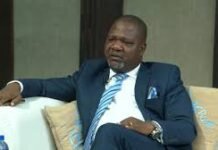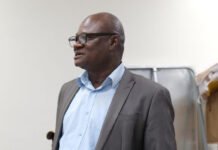By Esther Wright
Since President Dr. Julius Maada Bio assumed office in April 2018, the Judiciary of Sierra Leone has undergone significant reforms. One of the major changes is the independence of Magistrates and Judges, who no longer wait for directives from higher political authorities to deliver judgments. The days when court rulings were dictated by State House are now a thing of the past. This shift has been a major step forward in restoring public trust in Sierra Leone’s judicial system.
The country’s recent achievements, such as the signing of the MCC Compact with the United States, have boosted diplomatic relations with Western partners, including the European Union. Furthermore, under President Bio’s leadership, international donors have made significant commitments toward the implementation of the Justice Sector Reform Strategy (2024–2030). This plan aims to enhance access to justice and reinforce the rule of law in Sierra Leone.
Chief Justice, Babatunde Edwards, who served from 2018 to 2023, played a vital role in restoring the Judiciary’s credibility, earning the admiration of donor partners, including the United Nations Development Programme (UNDP). Yet, the recent case involving Jihad Basma and two others has raised concerns about whether these gains are being eroded.
Jihad Basma, a registered diamond dealer and exporter based in Kono, along with two others, is facing preliminary investigation in Magistrate Court under the jurisdiction of Magistrate Santigie Bangura. After being granted bail by Justice Momoh Jah-Stevens on August 29, 2024, Jihad Basma and the others met their bail conditions and were released from the Pademba Road Male Correctional Centre.
Since their release, the accused have adhered to court proceedings, regularly attending hearings, surrendering their travel documents and reporting twice weekly to the Master and Registrar. Prosecution witnesses have already begun testifying and have faced cross-examination by the defense. However, in an unexpected twist, on October 2, 2024, Justice Momoh Jah-Stevens rescinded their bail, ordering the accused to remain in custody until the Preliminary Investigation is concluded.
The case revolves around an alleged stolen diamond, which Jihad Basma is accused of buying. In an effort to avoid a drawn-out legal process, three prominent figures from Kono were invited to mediate between Jihad Basma and the diamond’s claimant, Benjamin Marrer. Leading the mediation efforts was Paramount Chief Sheku Amadu Tejan Fasuluku Sonsiama III, supported by Prince Saquee, the President of the Diamond Dealers Association and Hon. Saa Emerson Lamina, Chairman of the Parliamentary Sub-Committee on Mines and Mineral Resources.
In the initial stages of mediation, separate meetings were held with both parties, followed by joint discussions. Representing Jihad Basma was a delegation from the Lebanese community, including his uncle, Fouad Ayoub. The goal was to settle the matter out of court, a common practice in diamond-related disputes. Offers were made from Jihad Basma’s side, hoping to peacefully resolve the issue without further escalation.
However, negotiations stalled, reportedly due to Benjamin Marrer’s representative, known as KLM, insisting on a payment of $42 million for the stolen diamond. Paramount Chief Fasuluku’s efforts to mediate failed to produce an agreement, leading to the continuation of court proceedings.
Jihad Basma is facing significant pressure to settle the matter with Benjamin Marrer. However, he maintains his innocence, denying the claim that he purchased the stolen diamond. While Jihad Basma has expressed trust in the Judiciary, he also remains open to resolving the matter out of court to regain his freedom and resume his diamond business in Kono. His family has conveyed that he is still willing to explore a peaceful resolution if it would help him move past this legal hurdle.
The abrupt rescinding of bail in this case is raising questions about the integrity of the judicial process. Justice Momoh Jah-Stevens is a respected figure in Sierra Leone’s legal community, known for his fairness and commitment to justice. His recent pilgrimage to Mecca for the Hajj further solidifies his reputation as a God-fearing individual. Nonetheless, concerns are emerging that external political pressures could be influencing his decisions.
The twists and turns in this case risk undermining public confidence in the Judiciary. A justice system can only function effectively when it is perceived to be impartial, consistent and resistant to external manipulation.
It is important to remember that in any legal proceeding, individuals are presumed innocent until proven guilty. Jihad Basma and his co-accused deserve a fair trial, free from external influence. The credibility of Sierra Leone’s judicial system is on the line in this case and the Acting Chief Justice, Nicholas Browne-Marke, must ensure that justice is not only done but seen to be done.
In the end, common sense and the rule of law must prevail for the credibility of the Judiciary to remain intact. May justice be served fairly!




